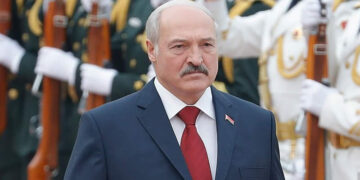 ASHGABAT, Turkmenistan: Pakistan on Saturday joined Turkmenistan, Afghanistan and India in signing the long-awaited over $7.6 billion dollars gas pipeline project to help it meet its sharply rising industrial and domestic demands. The “inter-governmental agreement” (IGA) was signed by President Asif Ali Zardari, Afghan President Hamid Karzai, Turkmenistan President Gurbanguly Berdimuhamedov and Indian Petroleum Minister Murli Deora here at a local hotel, almost 15 years after the project was envisioned. Prime Minister Manmohan Singh did not attend the summit as he was away to attend the India-EU summit at Brussels.The Gas Pipeline Framework Agreement (GPFA) was signed by the petroleum ministers of their respective countries with Syed Naveed Qamar representing Pakistan.
ASHGABAT, Turkmenistan: Pakistan on Saturday joined Turkmenistan, Afghanistan and India in signing the long-awaited over $7.6 billion dollars gas pipeline project to help it meet its sharply rising industrial and domestic demands. The “inter-governmental agreement” (IGA) was signed by President Asif Ali Zardari, Afghan President Hamid Karzai, Turkmenistan President Gurbanguly Berdimuhamedov and Indian Petroleum Minister Murli Deora here at a local hotel, almost 15 years after the project was envisioned. Prime Minister Manmohan Singh did not attend the summit as he was away to attend the India-EU summit at Brussels.The Gas Pipeline Framework Agreement (GPFA) was signed by the petroleum ministers of their respective countries with Syed Naveed Qamar representing Pakistan.
The 1,680 km long Turkmenistan-Afghanistan-Pakistan-India (TAPI) gas pipeline backed by the Asian Development Bank will bring 3.2 billion cubic feet of natural gas per day (bcfd) from Turkmenistan’s gas fields to Multan in Central Pakistan and end in the northwestern Indian town of Fazilka.Under the IGA, the four nations will commit to provide government support including security for the pipeline.Construction of the pipeline is likely to commence soon and will be completed by 2013-14. The project would help overcome Pakistan’s growing energy crisis that has caused electricity shortages and protests across the country.President Asif Ali Zardari in a statement to the media said gas connectivity through the project would add to regional prosperity by increasing synergies of economies, and will reinforce the institutional framework for expanding cooperation with each other.The President said Pakistan was an energy deficient country and welcomes its partnership in the project. He said Pakistan’s keenness for successful implementation of TAPI was an evidence of its quest for shared prosperity and economic development.The President said Turkmenistan’s policy of permanent neutrality has ensured focus on economic development. He said it has enabled it to enter into a strategic energy partnership with its South Asian neighbours.
“Pakistan and Turkmenistan share bonds of a common religion and history,” he said and conveyed best wishes of the people of Pakistan.President Zardari said the gas pipeline project would also bring economic dividends for Turkmenistan and contribute to the impressive pace of development under the visionary leadership of President Berdimuhammedov. He wished continued progress and prosperity to the people of Turkmenistan and other TAPI countries and congratulated all on the successful summit.Under the agreement Afghanistan’s share would be 500 million cubic feet per day (MMcfd), Pakistan 1,325 MMcfd and India 1,325 MMcfd.The demand for natural gas in Pakistan has increased by almost 10 percent annually from 2000-01 to 2007-08, reaching around 3,200 MMCFD, against the total production of 3,774 MMCFD, according to the sources at the Ministry of Petroleum.During 2008-2009, the demand exceeded the available supply, with production of 4,528 MMCFD against a demand for 4,731 MMCFD, indicating a shortfall of 203 MMCFD.
The project was initially designed to provide Turkmen gas to Pakistan through the volatile Afghanistan in an agreement signed in May 2002 in Islamabad and was known as Turkmenistan-Afghanistan-Pakistan pipeline project. India was later invited to join in April 2008.The four countries signed the framework of an agreement to construct the gigantic pipeline pumping natural gas to South Asia on September 20.
Pakistan’s federal cabinet gave approval to the Gas Pipeline Framework Agreement (GPFA) of the Turkmenistan-Afghanistan-Pakistan-India (TAPI) gas pipeline project in its meeting on Oct 27, 2010.
Pakistan has sought guarantees of gas supply from Turkmenistan and proposed a route that closely follows the Afghan-Iran and Pakistan-Iran borders and is shorter and safer.
The participating countries earlier agreed that the gas shall be supplied from Douletabad and adjacent gas fields of Turkmenistan which was subsequently changed to the South Yolotan-Osman and adjacent gas field with consent of TAPI members during 5th Technical Working Group meeting in August 2010.According to the initial plan the gas pipeline was to run alongside the Herat-Kandahar Highway in Afghanistan and pass through Chamman-Zhob-DG Khan-Multan in Pakistan. The project would not only bring millions of dollars in transit fee for Afghanistan and Pakistan, but also create jobs during and after the construction.The TAPI pipeline project was also part of the discussions at high-level donor meetings in 2006 and 2010 and was included in Afghanistan’s 2008 National Development Strategy. The G8 Foreign Ministers endorsed the project this year at Gatineau, Quebec and approved the new initiative to facilitate joint infrastructure projects identified by Afghanistan and Pakistan.Turkmenistan has the fourth largest proven reserves in the world. According to International Energy Outlook 2010, published by the US energy Information Administration, the world’s top reserves of gas are 6.609 trillion cubic feet.The top countries holding the biggest world reserves are Russia, with 25.4 percent or 1.680 trillion cubic feet (tcf), followed by Iran (15.8 percent or 1.046 tcf), Qatar (13.6 percent or 899 tcf),Turkmenistan (4 percent or 265 tcf) and Saudi Arabia (4 percent or 263 tcf) – App











